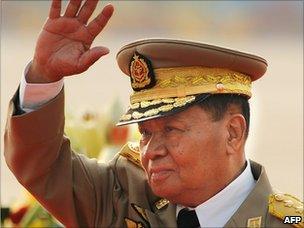Why was Aung San Suu Kyi released?
- Published

Why did they let her out? The Burmese military autocracy has found plenty of reasons to keep Aung San Suu Kyi in detention for most of the past two decades.
If having an American swim across a lake towards your home is enough to add 18 months to the sentence as it did in 2008, the generals could have found a compelling reason to keep the 65-year-old democracy campaigner under house arrest for a few more years without any difficulty at all.
But they let her out on the day her extended sentence ended and with no conditions attached to her release.
It is impossible to work out the thinking of the military government. They say nothing.
There is no way to read between the lines of their policy papers because there are no published lines to read between.
So unravelling the rationale is a blend of guesswork and informed speculation and there are many theories.
Common enemy
The election in Burma was the country's first for 20 years. Parties linked to the military junta won more than 80% of the vote in an election condemned by international observers as "a joke", "a complete sham" and "riddled with ballot rigging and corruption".
There has been very little coverage or comment on the election result which cemented the generals in power for five years; it has been smothered by news of the release of Ms Suu Kyi.
It is possible that the generals knew that the election would cause such outrage that the only way to mask it was to present the world with a different and more compelling story, the release of the most famous political prisoner in the world.
A senior foreign diplomat based in Rangoon has another theory: That the introduction of "democracy" has undermined the power of senior military figures, turning them into "parliamentarians".
By releasing Ms Suu Kyi, the top generals have delivered a unifying fear and hate factor to bind the restless generals together - a common enemy to confront.
Others say that the military government had simply run out of excuses to keep Ms Suu Kyi under house arrest.
This is certainly the theory that "The Lady", as she is known, subscribes to.
Or was it pressure from countries of the South East Asia grouping, Asean, which have found the detention of the Burmese human-rights champion an embarrassment?
Possible, but unlikely. Asean members who are worried - like the Philippines, Indonesia and Singapore - don't punch with much weight in the eyes of Burma's generals.
There is the possibility that the generals, with an election completed, wanted to further "clean up their act".
But this seems unlikely too because they clearly care so little for international opinion.
'Dignified heights'
One more reason to consider is that the generals realised that there would be uproar if they extended Ms Suu Kyi's house arrest.
They knew too that the world's media would flock (illegally) to Burma at her expected release date.
The solution, simple: Let her go, wait for news of her release to die down, and then find another reason to bang her up, in order to return to the status quo.
There are probably a number of connected reasons for Burma's military rulers to sign the release papers.
People I spoke to in Burma were agreed on one thing: General Than Shwe, the supreme commander and ruler, undoubtedly has a long-term strategy.
He is not acting impetuously, but has examined all the options with a firm objective in mind and many routes to get there.
Gen Than Shwe is often portrayed as a chess grand master moving pieces round on the Burmese and south-east Asian chessboard, and no-one believes he had not worked out all the possible scenarios.
Possibly the most compelling reason behind her release is a combination of all the consequences of not letting her go: Turmoil at home, fury abroad, the further erosion of Burma's international status and the absolute certainty that the only legacy for the ageing Gen Than Shwe would be the "Aung San Suu Kyi issue".
However, the risks of letting her out are huge.
The military knows for certain that even though she is no longer a young woman, she is no less a fire-brand and already she has laid down a challenge to the generals.
She has been careful not to confront and anger them too much, her language has been compromising and conciliatory, but she has challenged and mildly goaded them as well.
In an interview with the BBC she said she did not want the generals to fall, but she did "want them to rise to dignified heights and do what the people want".
Steam must already be hissing out of the ears of the military rulers in Burma.
Ms Suu Kyi says she is not afraid of being hurled back into prison, but she also knows that it would not serve the democratic interests of the Burmese people if it happened soon.